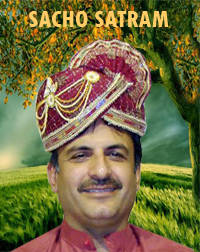
Sai Sadhram in his present form emphasizes that the Thursday Naam Daan serves the purpose of enriching our lives through the continuous recitation of Naam, guided by the benevolence of our Satguru.
The practice of Naam jaap, Naam daan, and Naam dhyan is aimed at imbuing our lives with the grace of our Satguru and achieving complete immersion in his wisdom. This is why it is held in strict confidence, to be silently, inwardly, and internally recited, chanted, and intoned, never to be uttered aloud.Often, we encounter information about it through various sources or individuals, but when we receive it from our Satguru, it becomes imperative not to disclose it. This confidentiality is upheld to fully grasp its magnificence, divinity, genuine value, and truthfulness, enabling us to merge with it. The essence of Naam lies in reaching and attaining Parmatma, and it is the pathway to realizing the divine.
Oftentimes, we engage in extensive reading and listening, immersing ourselves in the wisdom, guidance, commandments, and teachings of revered Saints and Mahatmas. These writings and speeches brim with profound truths. However, what we read and hear may not necessarily hold true in our own lives. What these eminent individuals articulated is indeed their truth, yet what we encounter through our reading and hearing remains their experiences, not our own. We are privy to their insights and words, but the direct experience they had eludes us.
For example, there are likely numerous individuals who have read about the United States, the United Kingdom, and Dubai. Others may have heard about these countries through various sources. However, there are also those who have had the opportunity to visit these nations.
Individuals who have heard or read about those countries might possess a broader range of information compared to those who have physically visited them. This is because those who visited may not have had the opportunity to explore all facets of these countries. Reading and hearing about these places allows people to accumulate knowledge about them simultaneously. However, visiting all these places at once is often impractical. Consequently, the most comprehensive understanding of these places typically resides with those who have personally experienced them, rather than with those who have only heard or read about them.
Indeed, those who have physically visited those countries are the ones who truly understand the reality and truth about them, rather than those who have gained knowledge solely through reading and hearing. To know the genuine essence, personal experience is crucial.
Similarly, receiving Naam is not sufficient for reaping its benefits and finding contentment. Reading, discussing, and listening to it can provide knowledge but to truly benefit and find contentment from it, personal experience and practice are indispensable.
Naam is held in strict confidence, avoiding public discussion to preserve its sanctity. It is meant to be recited inwardly, silently, and so frequently that we personally experience what our revered saints, Mahapurushs, and Satgurus have conveyed. Our aim is to attain the same destination that these great masters have reached through their own experiences, aligning ourselves with their wisdom. When the sacred Naam eventually emerges from our lips, it reflects our personal experience rather than mere reading or hearing. At that point, it becomes a source of guidance for all, facilitating a smoother journey through life. The ultimate purpose of Naam is to help us ascend to great heights and reach our intended destination.
Often, we find ourselves pondering why we don’t seem to learn or bring about positive change in our lives despite reading, hearing, and attending the divine satsangs of great masters. The reason lies in our failure to put into practice the teachings of these revered individuals, even after being exposed to their discourses and the wisdom of their experiences.
True understanding, appreciation, and personal experience of the truth they have conveyed only come to fruition when we genuinely start following the teachings of our great masters. It is through this active application that we can grasp the profound insights shared by our Satgurus, Mahapurushs, and Mahatmas.
Saijan once shared a story about a skilled thief, renowned for his clever tactics. As the thief’s son reached maturity, his father imparted all the intricacies of the craft, teaching him the art of thievery with great expertise.
The son, in turn, became an even more ingenious thief than his father. However, the father left his son with a crucial piece of advice: “To excel as a thief, never heed the words of any Sant or Mahapurush.” He warned his son never to listen to even a single word spoken by these holy individuals. The thief emphasized that the day his son would lend an ear to a Sant or Mahatma, he would lose his thieving talent and fail.
The thief instructed his son to steer clear of any place where a Sant or Mahatma resided or held a bhakti or satsang program. He further cautioned that if, by chance, his son found himself passing near such a place where a discourse was in progress, he should immediately plug his ears with his fingers and abstain from listening to what was being said. The son adhered to this guidance with great care, avoiding these locations, and diligently closing his ears should he accidentally come across them.
One day, the thief’s son encountered a vast crowd, all eagerly awaiting something, deeply engrossed in their focus. Seeing this, he thought it was a prime opportunity for him to carry out a theft without getting caught. He attempted to touch a few people, receiving no response, which boosted his confidence. He realized that no one was paying attention, and it seemed like the perfect moment to strike.
However, curiosity got the better of him, and he decided to inquire from someone in the crowd about the reason for so many people gathering in that spot. The individual responded that they had all assembled to listen to a Mahapurush who was delivering a satsang a short distance away. Everyone present was trying to absorb the wisdom shared in his discourse.
Upon learning about the presence of the Mahapurush, the boy hurriedly attempted to plug his ears with his fingers. But just before he could do so, he caught a snippet of the Mahapurush’s words: “A person remains happy when he always speak the truth, refrain from cheating others, and remain loyal.”
As soon as he heard these words, he hastily closed his ears, ensuring that he would not hear any more of the Mahapurush’s discourse, as his father had strongly cautioned him against it.
That night, he set his sights on stealing from the King’s palace. As he attempted to enter the palace, a vigilant guard spotted him and inquired about his identity and purpose for being there. The boy, recalling the Mahapurush’s words that truth leads to happiness, decided to test whether this was indeed the case. He confessed to the guard that he was a thief and had come to steal.
The guard burst into laughter, finding it difficult to believe that a thief would openly admit his intentions. He presumed the boy was perhaps a palace worker joking around and playfully allowed him to proceed into the palace.
Inside the palace, the boy found himself in the room containing the king’s treasures, filled with gold, diamonds, and other precious items. He seized this golden opportunity, collecting all the valuables and stashing them in the sacks he had brought. Afterward, he left the room and realized he was famished, with the palace kitchen conveniently nearby. He decided to temporarily store the sacks of stolen jewelry in the kitchen and proceeded to enjoy a hearty meal, savoring the delicious food he found.
Once his hunger was satisfied, conflicting thoughts started to flood his mind. He couldn’t shake the powerful words of the Sant he had heard, emphasizing the importance of loyalty for happiness. This left him torn, oscillating between the stolen riches and the words of the Sant. Eventually, he resolved not to take the stolen treasures because he understood that by stealing from the palace, he would be disloyal to the king. Having eaten from the king’s kitchen, he felt a sense of indebtedness to the king.
With a heavy heart, he left the sacks filled with precious jewels aside and left the palace. As he crossed the gate, the guard, half-jokingly, asked him if he had taken what he wanted since he was returning empty-handed. The boy replied that he hadn’t stolen anything because he didn’t want to be disloyal. The guard chuckled, thinking that the boy was playing along with his jest.
After some time, a palace staff members noticed the disarray in the king’s room and the sacks filled with stolen valuables. Concerned, they immediately informed the king about the theft. Panic ensued, and a search for the thief was launched.
When they questioned the guard, he recounted his encounter with the thief, explaining that he had assumed the man was a palace worker. The king, determined to bring the thief to justice, ordered the police to track down and apprehend the culprit.
The thief was eventually captured by the police and brought before the king for questioning. The king, looking directly at the thief, asked if he was the one responsible for the theft. The thief, without hesitation, admitted his guilt and replied in the affirmative.
The king was intrigued and asked the thief why he had left behind the stolen treasures, considering his profession as a thief. The boy proceeded to share his story, explaining that he was no ordinary thief, known for his cleverness, and had never been caught before.
He went on to describe his father’s advice about avoiding Sant and Mahatma and the importance of closing his ears if he encountered them. The boy told the king about overhearing a Sant’s teaching, which emphasized that speaking the truth and remaining loyal would lead to happiness. He recounted that when he arrived at the palace, the guard asked him where he was heading, and he spoke the truth, confessing that he had come to steal. However, after taking everything and having a meal in the palace kitchen, he was struck by the Sant’s powerful words. He couldn’t reconcile how he could steal from the king whose food he had eaten. These teachings had such a profound impact on his mind that he decided to leave everything behind.
The king was deeply impressed by the thief’s actions and commended him for genuinely following the words of wisdom from the Sant. He emphasized that people who adopt the qualities of truthfulness and loyalty have the potential to become the finest of human beings. Filled with admiration for the thief’s integrity, the king made a generous offer.
He not only expressed his happiness but also offered the thief a high-ranking position within the palace. The king provided him with the formal attire befitting his new role and appointed him as the palace treasurer.
Some days later, the thief grew worried because his son had not returned. He decided to set out in search of him. Just as he was preparing to leave, he spotted his son approaching. The sight left the thief utterly shocked; his son had transformed. The young man appeared confident, dressed in the formal attire of a treasurer, and was accompanied by palace soldiers.
The thief, curious about the remarkable change in his son, inquired about the reason behind this transformation. His son explained that he had always lived in fear, constantly hiding from people and dreading the police. He recounted the incident where he had to listen to a Sant’s words before managing to close his ears. These words emphasized that a person could find happiness through honesty and not cheating anyone.
His son vowed to live by these principles and shared how, by doing so, he had been granted the honor of becoming the palace treasurer. He also expressed his belief that by adhering to the teachings of the Sants, he could achieve great heights in life. The son encouraged his father to reflect on this transformation and understand how a person could undergo such a profound change by following the teachings of the Sants.
Hazir Swaroop Sai Sadhram Saheb emphasizes that an individual can reshape his life by choosing to walk in the footsteps of the great Sants. According to him, the purpose of Naam is to fully embrace the teachings of our Satguru. It is not merely about listening to words of wisdom but to integrate them into our lives, and being loyal to those who have been kind to us.
Living a genuine life, in his view, involves more than just reading and listening to noble principles. It necessitates their practical application in our daily lives, culminating in a life filled with truth and authenticity, where we not only read and listen but also experience the teachings of the great masters.
Saijan emphasizes that Naam is a priceless treasure, unparalleled in its significance. It serves as a direct connection with Parmeshwar (the Divine). To attain great heights, we must continuously and silently recite, subvocalize, and practice it within our minds, maintaining a constant and unwavering focus on this sacred practice.
Saijan conveys that there are various ways in which people offer their help. Some declare their support verbally, some provide assistance by accompanying us in our journey, and others aid us by revealing their influential identity. Similarly, Naam possesses immense power, as its mere presence has the capability to bring about significant changes. It holds the power to control and influence all occurrences in the universe.
Hazir Swaroop Sai Sadhram Saheb draws a parallel between preserving our treasures and preserving Naam. Just as we safeguard our valuable possessions by not leaving them out in the open, we should similarly protect Naam because it is exceedingly valuable and precious, even though it’s just a word. Naam holds incredible power.
Saijan provides an analogy to illustrate this point. When we have wooden sticks and iron together, we separate the iron from the wooden sticks as it is more valuable. We keep silver separately, and when we possess gold, we preserve it in a secure locker because its value surpasses that of silver. The volume of silver may be greater than that of gold, but gold is more precious. And if we have diamonds, despite their small size, we take great care to wrap them in cloth, place them in a well-secured box, and then store them in a locker, as their worth is even greater.
Similarly, we should constantly think about safeguarding the precious jewel of Naam within our minds, recognizing its immeasurable value.
Saijan points out that in our daily lives, we often use countless words, many of which are pointless, unimportant, excessive, devoid of meaning, and ultimately a waste of our energy and communication. However, Naam is a small word, yet it holds tremendous power. This powerful word has the ability to elevate us and guide us toward the attainment of Parmatma (the Supreme Being). Its significance far surpasses its brevity.
Saijan emphasizes that the sacred Naam of Sacha Sai possesses the extraordinary power to transform every cycle of our births and ultimately lead us to Moksh (liberation). He points to the journey of our lives as evidence that those who departed this world while reciting the pious Naam lived profoundly meaningful lives and found eternal peace. Prominent individuals like Bhai Shiva Ram, Bhai Hazari Ram, and Bhai Lachhu Ram serve as examples of the transformative power of Naam, as they achieved divinity during their lifetimes.
To tap into this transformative power, Saijan advises that we must diligently preserve Naam. When we sit in Nem Sahib, we should subvocalize it with deep respect, love, care, devotion, and affection, all done silently and inwardly. This practice is instrumental in harnessing the full potential of Naam.
Saijan emphasizes that our “jaap” or recitation should exclusively involve the pious word of Naam. This is because the other words lack value and only serve to occupy our thoughts, diverting us toward mundane, daily routines. In contrast, the word of Naam has profound significance, leading us on a path to attain Parmatma (the Supreme Being).
By wholeheartedly embracing Naam, we establish a connection with Parmatma, who fills our inner self, uniting us with Him and allowing us to achieve remarkable heights of spiritual oneness.
Saijan Says that because Naam is so powerful and valuable we keep it confidential . It’s actual worth is known only by self experiencing it. The words and satsangs we read and hear of the great sants are powerful but only when we ourselves experience what those great masters experienced and explained in books and through their satsangs.
Saijan expalins that when we also experience what those great sants experienced by reciting Naam, with deep dovotion, dedication and love and experience the eternal truth, then only we also attain the great heights of oneness and by telling others we can take them along with us to succeed in attaining the same level of true Moksh.
Saijan underscores the confidentiality of Naam, emphasizing its immense power and value. Its true worth can only be fully comprehended through personal experience. The words and satsangs we read and hear from great Sants are indeed powerful, but their true significance is realized when we, as individuals, personally undergo the same experiences and insights that these great masters have shared in their books and satsangs.
Saijan explains that by reciting Naam with deep devotion, dedication, and love, and by experiencing the eternal truth it represents, we can reach profound heights of spiritual oneness. Once we have attained this level of realization, we can then guide and lead others to achieve the same level of true Moksh (liberation). Sharing this transformative experience with others can help them along the path to spiritual fulfillment.
Hazir Swaroop Sai Sadhram emphasizes that the ultimate goal of Naam is to transcend the cycle of birth and death, achieving Moksha (liberation), and assisting others in reaching the same spiritual fulfillment. He underscores that if a person can attain greatness by earnestly following just two teachings of a great Sant with determination, then by embracing and wholeheartedly following the entire teachings of great masters, one can achieve boundless greatness.
Saijan blesses us with a prayer, hoping that we all put forth sincere efforts to practice Naam regularly, lovingly, with pure dedication and devotion. May we be blessed by Parmatma and become one with the Divine, ultimately reaching the highest spiritual heights.



